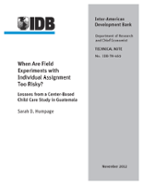When Are Field Experiments with Individual Assignment Too Risky?: Lessons from a Center-Based Child Care Study in Guatemala
Date
Nov 2012
Randomized controlled trials, prized for generating unbiased estimates of treatment effects, have become popular in development economics. However, RCTs do not always offer sufficient statistical power, which is reduced in experiments with imperfect compliance to treatment assignment. This is of critical importance if effect sizes are modest, and if non-compliance may occur. Both are likely in experiments in center-based childcare programs with individual-level randomization for several reasons. Dropout in the treatment group may occur because families' demand for preschool is unknown when the sample is constructed, and it evolves over time as households experience shocks and as they learn about the center. Non-compliance in the control group arises when children access the program or alternative preschool programs. This paper uses a recent evaluation of the Hogares Comunitarios program in Guatemala to illustrate challenges inherent in experimental evaluations and offers strategies to identify situations in which studies are more likely to succeed.




